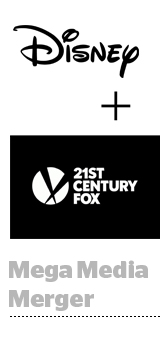
After weeks of buildup, Disney has finally pulled the trigger and will acquire several major assets from 21st Century Fox in a $52.4 billion all stock deal, announced Thursday.
Those assets include 20th Century Fox’s film and TV studios, cable networks like FX and National Geographic, stake in foreign networks Star India and UK-based pay TV provider Sky and Fox’s 30% stake in Hulu – which gives Disney a controlling 60% stake.
Remaining 21st Century assets, including the Fox Broadcasting network, Fox News and Fox Business will be spun off into a new company.
Hulu Hopes
Owning a majority stake is substantial for Disney, with one AdExchanger source describing it as the “hidden gem of the whole Fox deal.” Owning most of Hulu gives Disney instant video infrastructure virtually overnight.
Recall that Disney pulled its film content off of Netflix in August because it planned to build its own direct-to-consumer streaming service by 2019.
It planned to launch its own ESPN streaming service built off the back of its $1.58 billion acquisition of the streaming platform BAMTech.
“It doesn’t take too many leaps to say that if they get controlling interest in Hulu through the acquisition of Fox properties, now all of a sudden they’ve got an established platform with millions of subscribers,” said a source with knowledge of Disney. “Although that US install base is not as big as Netflix, it’s big enough that Disney could immediately roll out tiered offerings for its content through the Hulu service.”
Hulu can help Disney commercialize its OTT offering and pave new avenues to alternative revenue streams, including data-driven advertising – which right now isn’t Disney’s forte.
“We believe Hulu is a great opportunity to expand in the direct to consumer space and having control of it will allow us to greatly accelerate Hulu … and allow it to become even more of a viable competitor,” Disney Chairman and CEO Bob Iger said during an investor call Thursday morning. “We’ll not only be flowing more content in Hulu’s direction, but managing Hulu becomes a little bit more clear, efficient and effective with a controlling shareholder.”
Scale, Variety
And the premium networks Disney inherits from Fox will attract advertisers who want scale and diversification in audience packages and data opportunities.
“Now when we go to ABC to purchase, they have more tools in their shed to deliver a more varied audience than before,” said David Campanelli, SVP and director of national TV for Horizon Media. (ESPN is always sold separately.)
Say an advertiser wants to purchase an audience of young men and young women. After the acquisition, they could buy inventory on FX’s sister channel FXX, which caters to younger males, alongside Disney’s Freeform (formerly ABC Family), which skews toward younger females.
Previously, Disney didn’t have enough variation in its audience to create a compelling or comprehensive data offering for some buyers. Campanelli said: “Adding FX and FXX, as well as Nat Geo, should offer enough audience breadth and variance to start to apply data optimization.”
Plus, once Disney launches its direct-to-consumer video service, advertising could become an incremental and important part of growing its revenue mix in addition to subscriptions.
That combination, according to one source, “potentially becomes a new offering for Disney in the marketplace unlocking content and reach for advertisers, that’s driven by data.”
First-party pursuits?
It’s not clear whether Fox’s assets will add a significant amount of first-party data to Disney’s offering.
“This is not what AT&T or Verizon would bring to the table with all of their mobile and MVPD subscriber files, which they can attach to content and drive addressability through a vertical stack of content, distribution and data,” said one source who asked to remain anonymous because of their business dealings with Fox.
With the exception of Hulu and Sky in Europe, which have direct-to-consumer offerings and subsequently – valuable first-party data – this deal, according to several industry insiders, is not necessarily all about the ads.
And Disney won’t necessarily compete with the big mobile carriers, who are also seeking more control over content, distribution and data.
“No question this will give Disney more scale of inventory to sell, but not nearly as much as NBCU or even Viacom,” said Dave Morgan, CEO of Simulmedia. “Since Disney is not a distributor or MVPD, I don’t know if it is fair to compare data scale to Comcast or Verizon.”
This post was syndicated from Ad Exchanger.

More Stories
Meta Reports Record Q1 Revenue, But Its Plan For The AI Long Game Has Investors Spooked
WBD Reveals First-Party Data Platform to Unify Buying Across Its Portfolio
The IAB Predicts Social Video Will Overtake CTV This Year